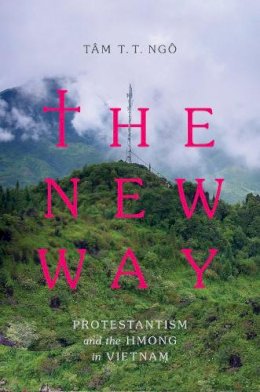
The New Way. Protestantism and the Hmong in Vietnam.
Tâm T. T. Ngô
In the mid-1980s, a radio program with a compelling spiritual message was accidentally received by listeners in Vietnam’s remote northern highlands. The Protestant evangelical communication had been created in the Hmong language by the Far East Broadcasting Company specifically for war refugees in Laos. The Vietnamese Hmong related the content to their traditional expectation of salvation by a Hmong messiah-king who would lead them out of subjugation, and they appropriated the evangelical message for themselves.
Today, the New Way (Kev Cai Tshiab) has some three hundred thousand followers in Vietnam. Tam T. T. Ngo reveals the complex politics of religion and ethnic relations in contemporary Vietnam and illuminates the dynamic interplay between local and global forces, socialist and postsocialist state building, cold war and post–cold war antagonisms, Hmong transnationalism, and U.S.-led evangelical expansionism.
Product Details
About Tâm T. T. Ngô
Reviews for The New Way. Protestantism and the Hmong in Vietnam.
Pascal Bourdeaux
Cross-Currents: East Asian History and Culture Review
"Not only is the book remarkable for its collection and use of hard-to-get data from a wide array of sources in Vietnam and abroad, including extended periods of fieldwork in a Hmong village, but also for the story it recounts of conversion not by mission on the ground but via broadcast from the air."
Nick Cheesman
New Books in Southeast Asian Studies (NBN)
"This book on the conversion of the Vietnamese Hmong is important because, to an extent, the history of modern Vietnam is a history of contending with Christianity. . . . Ngô argues that beginning in the 1980s the Vietnamese Hmong, disillusioned by broken promises and oppressive developmental policies, have seized Protestantism as a route to empowerment and modernity."
Mai Na M. Lee
Pacific Affairs
"Represents a great achievement as the summation of extensive independent fieldwork on a topic that is essentially the convergence of three 'politically sensitive' topics in Vietnam: religious change, ethnic politics, and transnational groups. Ngô has become the first academic to publish English-language research about this topic based on ethnographic methods, which is no mean feat given the government restrictions placed on academic research in upland Vietnam."
Seb Rumsby
Southeast Asian Studies
